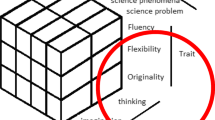Abstract
We investigated 101 online hyperstories created at school by students aged 4-18 using the same authoring tool, to discover recurring characteristics of youngers’ hypermedia narratives and their underlying creative process. The findings of our empirical study offer a contribution to the digital storytelling field from a conceptual and a practical perspective. They provide a deeper understanding of digital storytelling activities performed by youngsters in educational settings, highlighting a tension between regularity and creativity that has some correlations with authors’ age and school context. In addition, the discovered recurrent features can be used as classification means for digital stories and can be translated into guidelines to support the authoring process and to improve the functionalities of storytelling tools.
Access this chapter
Tax calculation will be finalised at checkout
Purchases are for personal use only
Preview
Unable to display preview. Download preview PDF.
Similar content being viewed by others
References
Jacobs, J., Tunnell, M.: Children’s Literature, Briefly, 3rd edn., pp. 66–69 (2003)
Patron, S.: On the Epistemology of Narrative Theory: Narratology and Other of Fictional Narrative. University of Paris 7-Denis Diderot (2008)
Nicolopoulou, A.: Children and narratives: toward an interpretive and sociocultural ap-proach. In: Bamberg, M. (ed.) Narrative development: six approaches, pp. 179–216. Lawrence Erlbaum, Mahwah (1997)
Propp, V.: Morphology of the Folk Tale. The American Folklore Society (1968)
Levi Strauss, C.: Myth and Meaning: Cracking the Code of Culture. Routledge, New York (1999)
Di Blas, N., Garzotto, F., Paolini, P., Sabiescu, A.: Digital Storytelling as a Whole-Class Learning Activity: Lessons from a Three-Year Project. In: Iurgel, I.A., Zagalo, N., Petta, P. (eds.) ICIDS 2009. LNCS, vol. 5915, pp. 218–229. Springer, Heidelberg (2009)
Feher, P.: Towards effective student-centered, constructivist learning: Build Your Own Digital Story! In: Proc. ED-MEDIA 2008, pp. 2364–2367. AACE (2008)
Garzotto, F., Retalis, S.: A Critical Perspective on Design Patterns for e-Learning. In: Lockyer, L., et al. (eds.) Learning Objects: Is-sues, Applications and Technologies, pp. 346–372. Idea Group, USA (2009)
Author information
Authors and Affiliations
Editor information
Editors and Affiliations
Rights and permissions
Copyright information
© 2010 Springer-Verlag Berlin Heidelberg
About this paper
Cite this paper
Garzotto, F., Herrero, E., Salgueiro, F. (2010). One Tool-Many Paradigm: Creativity and Regularity in Youngsters’ Hyperstories. In: Aylett, R., Lim, M.Y., Louchart, S., Petta, P., Riedl, M. (eds) Interactive Storytelling. ICIDS 2010. Lecture Notes in Computer Science, vol 6432. Springer, Berlin, Heidelberg. https://doi.org/10.1007/978-3-642-16638-9_8
Download citation
DOI: https://doi.org/10.1007/978-3-642-16638-9_8
Publisher Name: Springer, Berlin, Heidelberg
Print ISBN: 978-3-642-16637-2
Online ISBN: 978-3-642-16638-9
eBook Packages: Computer ScienceComputer Science (R0)




